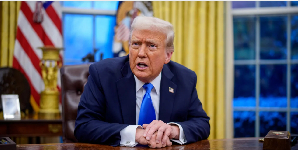On April 2, 2025, U.S. President Donald Trump announced a series of new tariffs, including a universal 10% tariff on all imported goods starting April 5.
Additionally, higher “reciprocal tariffs” were imposed on specific countries, with Lesotho facing a 50% tariff, Madagascar 47%, and Botswana 37%.
President Trump described this initiative as a “Declaration of Economic Independence,” aiming to bolster domestic industries and address trade imbalances.
These tariffs are expected to have significant economic implications for the affected African nations. For instance, Lesotho’s textile and apparel industry, a major contributor to its economy, may experience reduced exports to the U.S., potentially leading to job losses and economic downturn.
Similarly, Madagascar and Botswana, which rely heavily on exports to the U.S., could face economic challenges due to decreased competitiveness in the American market.
Economists and business leaders have expressed concerns that these tariffs may lead to increased prices for U.S. consumers and potential retaliatory measures from affected countries, potentially escalating into a broader trade conflict.
AP News
African leaders and trade officials are closely monitoring the situation, considering strategies to mitigate the impact on their economies. This development underscores the interconnected nature of global trade and the far-reaching consequences of policy shifts by major economies.
BREAKING: @POTUS Trump’s Reciprocal Tarrifs Have Been Released & They Give Discounts To Some Nations Where We Get Key Imports While We Wean Off Their Imports & Build Back Manufacturing In The United States. pic.twitter.com/03zTvnQnIz
— John Basham (@JohnBasham) April 2, 2025



